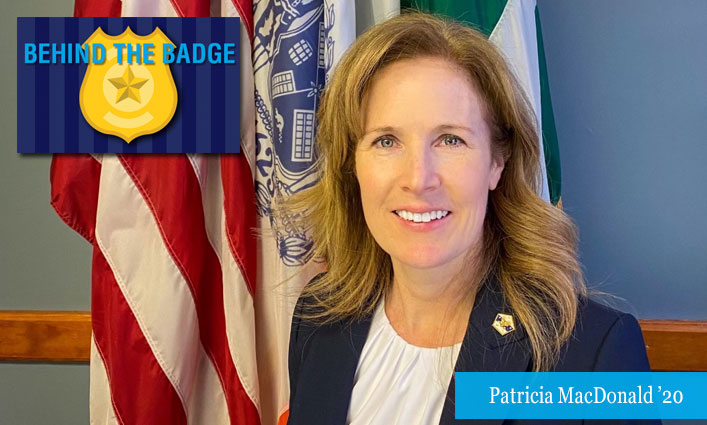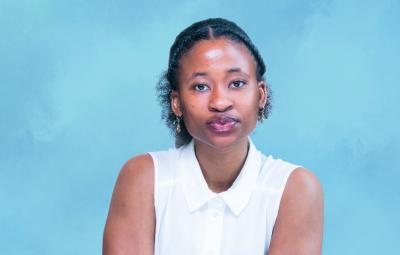
Since its inception, John Jay College has been an institution proud to educate public safety leaders in law enforcement, fire suppression, and emergency medical services. Every day, these brave members of our community work hard to keep us safe. We’re continually grateful for their service, and in recognition of their considerable contributions to our safety, we’re dedicating our “Behind the Badge” series to them. In these articles we get to see the man or woman “behind the badge.” We get to know what inspires them, understand what challenges them, and most importantly learn about their jobs through their own thoughts and experiences.
As we celebrate Women’s History Month, we’re excited to feature Patricia MacDonald ’20, Deputy Inspector, Intelligence Bureau, and a graduate of the New York Police Department Executive Master’s Program, in our “Behind the Badge” article series.
Who or what inspired you to embark on a career in law enforcement?
I grew up in a working-class Brooklyn neighborhood where I encountered many police officers—whether it was talking to them while they were patrolling my community, or interacting with family members of friends who happened to be in law enforcement. During New York City’s crime wave in the 1970s and 1980s, I witnessed police officers in action and developed a deep respect for the profession. When I graduated from high school, many of my friends either took the test to become police officers or firefighters, or they opted to join the military. In 1988, three police officers were shot and killed in the line of duty, two on the same day, they were not that much older than me. This is when I started to think about a career in law enforcement. A couple of years later, while I was in college, a friend convinced me to take a test allowing me to embark on my police career.
“Policing is a resilient profession. I’ve seen the NYPD bounce back after the worst of times, such as the historic crime reduction starting in the mid-1990s, the 9/11 terror attacks, and Hurricane Sandy.” —Patricia MacDonald
What does a typical day look like for you on the job?
I’m a Commanding Officer of a sub-unit within the Intelligence Bureau. My daily responsibilities include participating in briefings, which are held throughout the day involving current situations in New York City, in the country, and around the world. Under my command is the Threat Assessment and Protection Unit (TAPU). This unit is responsible for the planning and security of major events in which a dignitary is in attendance—examples include the United Nations General Assembly, Fleet Week, Congressional visits, presidential and head of state visits, and parades. TAPU conducts the dignitary protection training for all members of the NYPD, as well as other agencies, and also conducts investigations and threat assessments in cases where a police officer or elected official is the subject of a threat. TAPU also serves as the repository for all diplomatic incidents occurring in New York City.
I also command the International and Domestic Liaison Programs. The NYPD has members assigned as liaison posts strategically placed throughout the world. These posts are responsible for compiling timely and accurate information about terrorism-related threats, attacks, and transnational crime occurring in their area of responsibility. The information is relayed in real-time in order to assess the nexus to New York City and to respond accordingly. The Domestic Liaison Unit is similar in that it gathers information from local and multi-regional agencies within the United States.
Describe your best day on the job. What happened that day to make you proud, happy, or encouraged?
It’s hard to pinpoint the best day on the job. I’ve had many good days and some bad. There has been so much encouragement for me, namely the fact that policing is a resilient profession. I’ve seen the NYPD bounce back after the worst of times, such as the historic crime reduction starting in the mid-1990s, the 9/11 terror attacks, and Hurricane Sandy. Both civilian and police officers in our communities came together to help out in some way, shape, or form. Currently, the NYPD and New York City are in the process of recovering from the Covid-19 pandemic. I see it every day I come to work, there is a sense of resiliency and normalcy. I have no doubt that the City will be thriving again soon.
“Since I didn’t let my dedication to the NYPD interfere with my love for my family, I was able to create a good balance between the two.” —Patricia MacDonald
What’s the most challenging aspect of your job?
The most challenging aspect of my job was raising a family while rising through the ranks. My husband is also a police officer, so this made it especially challenging. For years we worked opposite hours and had different days off, all while studying for the promotional exams. It wasn’t easy, but I believe that since I didn’t let my dedication to the NYPD interfere with my love for my family, I was able to create a good balance between the two.
What’s the most rewarding aspect of your job? Why is this so impactful?
The most rewarding aspect of my job is knowing that I play a small role in keeping the people of New York City safe. When taking part in the protection and security of a major event—like the President of the United States or another high-threat dignitary is coming to the City—and the event concludes without incident, that is the reward. It is impactful because if there is an incident at a major event, it would have an effect not only on the NYPD but New York City as a whole.
“When taking part in the protection and security of a major event—like the President of the United States or another high-threat dignitary is coming to the City—and the event concludes without incident, that is the reward.” —Patricia MacDonald
How has your John Jay education enhanced your career?
Serving in a leadership role is not easy. It requires excellent communication and listening skills, as well as the ability to be able to project authority without demeaning the individual contributions of those I’m responsible for. I’m constantly looking for ways to enhance these skills. This drive to enhance these skills led me to get my graduate degree through the Criminal Justice Master of Arts Program for NYPD Executives. The program succeeded in enhancing my leadership and communication skills, as well as the willingness to take on new challenges.
Can you remember any specific lessons or classes that really stuck with you or inspired you?
I received my graduate degree from John Jay in 2020, and I consider it one of my greatest accomplishments. Delving back into school later in life wasn’t easy, but it turned out to be a great learning experience. My concentration was Criminal Justice, and even though I spent more than half my life in law enforcement, I discovered there was still a lot to learn. One class I really enjoyed was CRJ 710, Issues in Criminal Justice. It was taught by two professors who couldn’t have had more opposing views on the topic. It was fascinating getting each of their perspectives on issues such as crime and punishment, incarceration, the death penalty, and the court cases that affect the rules governing these issues.
“One class I really enjoyed was CRJ 710, Issues in Criminal Justice. It was taught by two professors who couldn’t have had more opposing views on the topic. It was fascinating getting each of their perspectives on issues such as crime and punishment, incarceration, the death penalty, and the court cases that affect the rules governing these issues.” —Patricia MacDonald
What advice would you give to future law enforcement officers?
My advice would be to always have a positive attitude and take all the opportunities that are offered to you. Now more than ever, there are opportunities for advancement in police departments across the country, especially for women.
What do you want the public to know about your job?
Don’t let a few bad apples get in the way of your opinion of police officers. Policing isn’t just a job it is a dedication, a trying but rewarding profession, with a lot of responsibilities. Most officers are hardworking, caring, and compassionate people that have families, bills, and all the trials and tribulations that come with it, just like everyone else.



